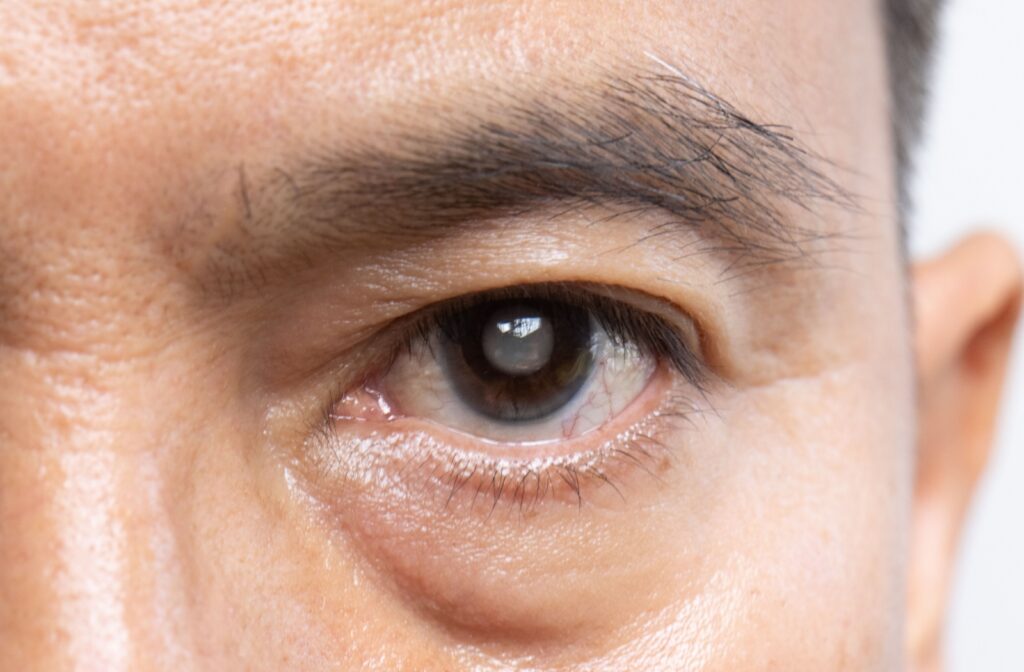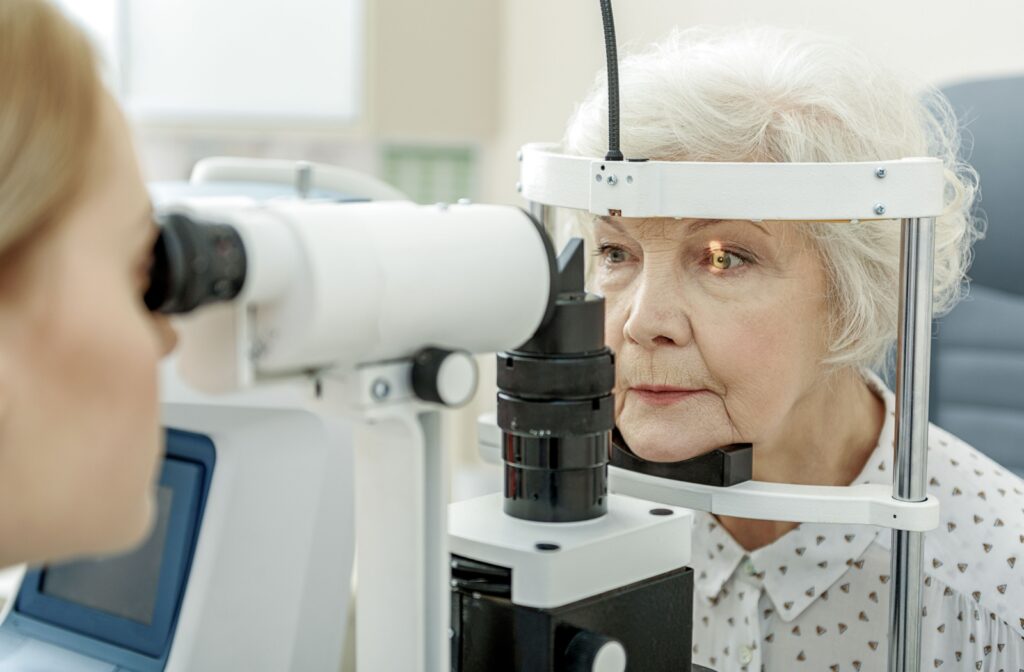Cataracts are a common eye condition that can affect your vision over time, making daily activities like reading or driving more difficult. Early signs of cataracts include blurry vision, increased light sensitivity, difficulty seeing at night, and colours appearing duller. If you notice any of these changes, booking a comprehensive eye exam is the best way to detect cataracts early and explore treatment options.
Understanding Cataracts
Your eye’s natural lens is responsible for focusing light and providing clear vision. However, as you age, proteins in the lens can break down and clump together, causing the lens to become cloudy. This clouding is known as a cataract. Over time, cataracts can worsen, leading to more significant vision impairment.
Cataracts are extremely common, affecting millions of Canadians. If you suspect you may have cataracts, an eye exam can help determine the severity of the condition and the best course of action. Early detection allows for better management, so regular visits to an optometrist are essential.
What Causes Cataracts?
Cataracts typically develop due to age-related changes in the eye, but several other factors can contribute to their formation:
- Aging: The natural wear and tear of the eye’s lens over time.
- UV exposure: Prolonged exposure to sunlight without proper eye protection.
- Medical conditions: Diseases like diabetes can increase the risk of cataracts.
- Previous eye injuries or surgeries: Trauma to the eye can accelerate cataract development.
- Medications: Long-term use of steroids has been linked to cataracts.
While cataracts are most common in older adults, they can develop at any age. Protecting your eyes from UV rays, maintaining a healthy lifestyle, and scheduling regular eye exams can help delay their onset.
How to Recognize Cataracts Early
Cataracts develop gradually, and their symptoms may not be noticeable at first. However, as they progress, you may experience:
- Blurry or cloudy vision that doesn’t improve with prescription glasses.
- Increased sensitivity to light and glare, especially from oncoming headlights at night.
- Difficulty seeing clearly in low-light conditions, making nighttime driving challenging.
- Colours appearing faded or yellowed, making it harder to distinguish shades.
- Frequent changes in eyeglass prescriptions, yet still struggling with clear vision.
- Double vision in one eye, which can be disorienting and affect depth perception.
If you notice any of these symptoms, don’t ignore them. The earlier cataracts are diagnosed, the more effectively they can be managed. An optometrist can confirm if you have cataracts and recommend next steps.

Managing Cataracts in Their Early Stages
In the early stages, cataracts may not require immediate surgery. Many people can manage mild cataracts by making lifestyle adjustments, such as:
- Using brighter lighting at home or work to improve visibility.
- Wearing UV-protective sunglasses to reduce further lens damage.
- Adjusting prescriptions for glasses or contact lenses to compensate for vision changes.
- Avoiding glare from headlights or screens by using anti-reflective coatings on glasses.
- Scheduling routine eye exams to monitor cataract progression.
While these steps can help improve vision in the short term, cataracts will continue to develop. If they begin significantly affecting your daily life, surgery may be the best option.
How to Reduce Your Risk of Cataracts
While cataracts are often a natural part of aging, there are steps you can take to slow their progression and protect your vision for as long as possible. By adopting healthy eye care habits, you can reduce your risk of developing cataracts. Some effective strategies include:
- Wear UV-protective sunglasses: Prolonged exposure to UV rays can accelerate cataract formation. Choose sunglasses with 100% UV protection to shield your eyes from harmful rays.
- Maintain a healthy diet: Foods rich in antioxidants, like leafy greens, carrots, and fish high in omega-3 fatty acids, can support eye health and slow cataract development.
- Quit smoking: Smoking releases toxins that can damage the eye’s lens, increasing your risk of cataracts. Quitting smoking benefits both your vision and overall health.
- Manage health conditions: Conditions like diabetes and high blood pressure can contribute to cataracts. Keeping these conditions under control with a healthy lifestyle and regular medical checkups can help protect your vision.
- Schedule regular eye exams: Routine eye exams allow your optometrist to monitor changes in your vision and detect cataracts early when treatment options are more effective.
Taking proactive steps now can help preserve your eyesight and delay the onset of cataracts.
Cataract Surgery: A Safe & Effective Solution
Cataract surgery is one of the most common and successful eye procedures performed worldwide. It involves removing the clouded lens and replacing it with a clear artificial lens, restoring vision clarity.
The surgery is typically done on an outpatient basis and takes less than an hour. Most patients notice an improvement in vision within a few days. Your optometrist can help determine if and when surgery is necessary based on your symptoms and lifestyle needs.
Recovering from Cataract Surgery
Recovery from cataract surgery is usually smooth, but there are a few precautions to follow to make sure your eyes properly heal:
- Avoid rubbing your eye to prevent irritation or infection.
- Use prescribed eye drops as directed to reduce inflammation and promote healing.
- Wear a protective shield or sunglasses when outdoors to prevent UV exposure.
- Avoid strenuous activities like heavy lifting for a few days after surgery.
- Attend follow-up appointments to monitor healing progress.
Most people can resume normal activities within a week. However, full healing may take a few weeks, so it’s important to follow your optometrist’s post-surgery instructions.
Take Control of Your Eye Health
Cataracts don’t have to diminish your quality of life. Recognizing the early signs and seeking timely treatment can help preserve your vision and independence. If you’ve noticed any vision changes, don’t wait—schedule an eye exam today.
Dr. Zargar Eyecare is committed to helping you maintain clear, healthy vision at every stage of life. Book an appointment with us to discuss your eye health and learn more about your options for cataract management.

